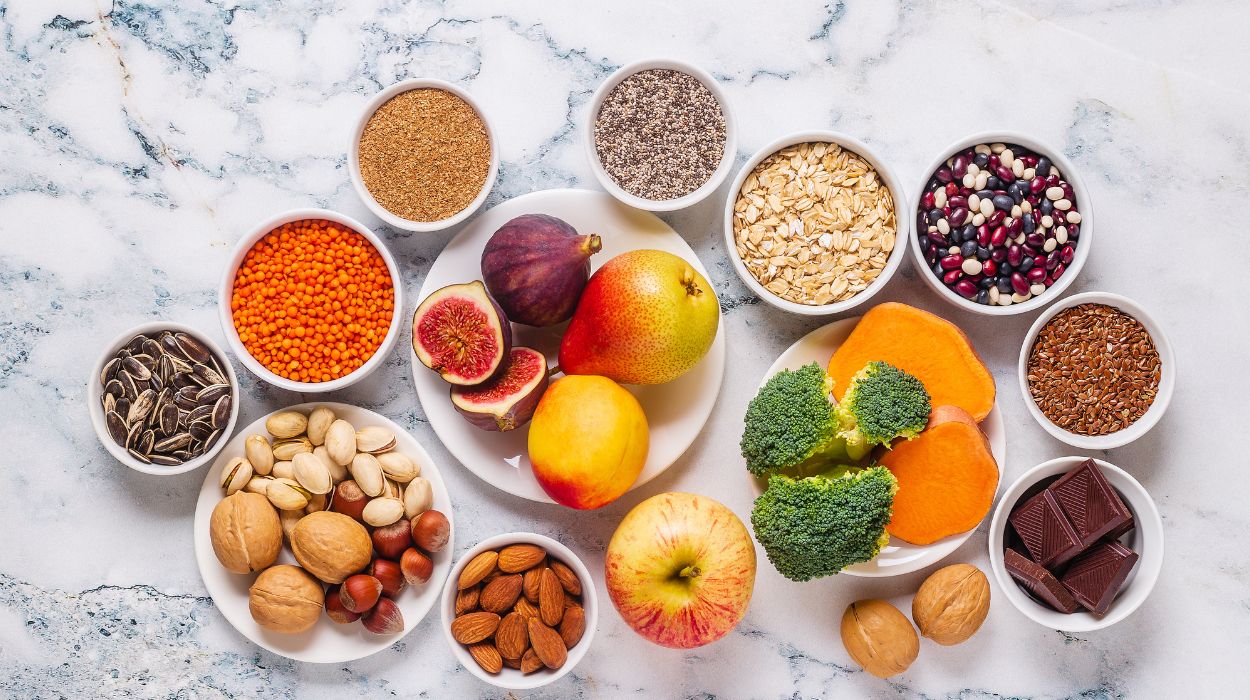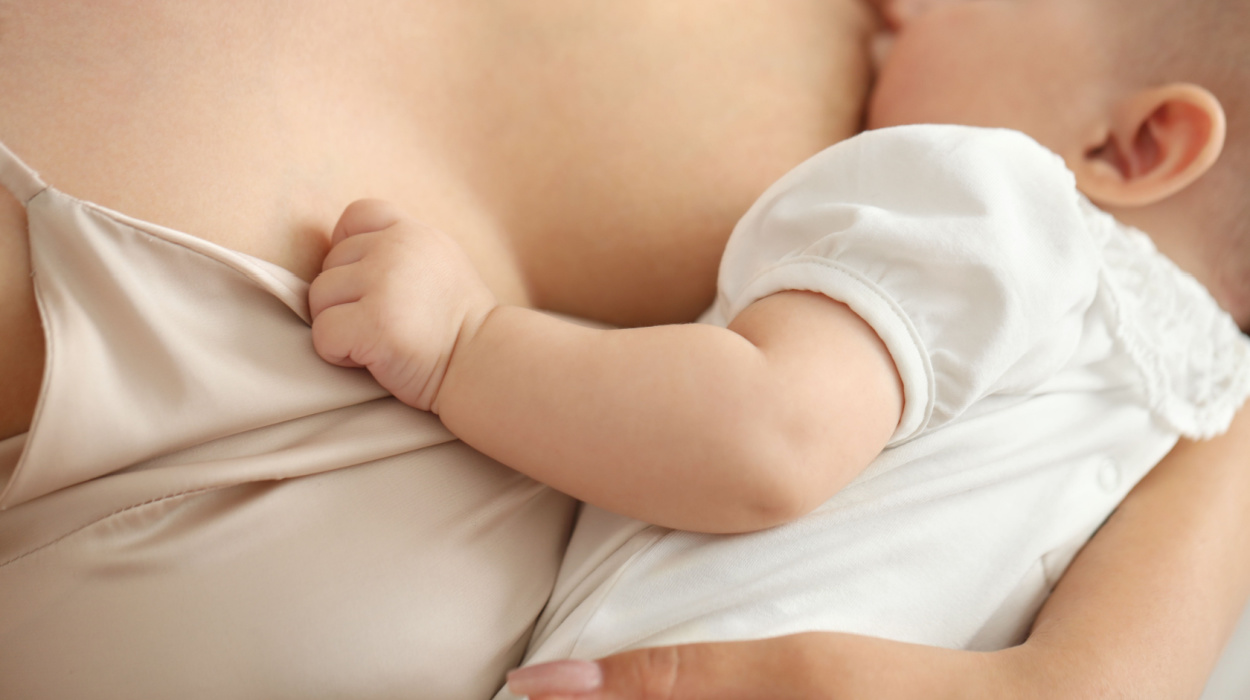According to the CDC, pregnant women should not gain more than 40 pounds[1] – less if overweight pre-pregnancy. But only 32% reach that goal. Approximately 21% of women gain too little weight during pregnancy, and 48% of women gain too much weight.
Women who gain too much weight during pregnancy will want to shed the pounds quickly after delivery. Some who breastfeed may feel that breastfeeding will get in the way of their weight loss goals. Additionally, how to lose weight while breastfeeding without affecting milk supply is a valid worry.
Fortunately, there are many answers to how to lose weight while breastfeeding. This article will offer several weight loss solutions.
How To Lose Weight While Breastfeeding
Women can lose weight while breastfeeding by:
- Drinking more water.
- Eating fiber-rich foods.
- Exercising.
- Avoiding excessive refined carbs.
- Limiting calories to 1800 per day.
- Adding green tea to your diet.
- Getting adequate sleep.
- Spicing up your meals.
- Eating overnight oats for breakfast.
9 Best Ways To Lose Weight While Breastfeeding
A 2014 study[2] showed that breastfeeding helped only a little with pregnancy weight loss. Some women feel breastfeeding makes losing weight harder. Staying home with their baby may limit exercise. Additionally, eating more nutritional food for a healthy milk supply can add to caloric intake.
Women may also rack up pounds while they wait for their periods to return. This phase is similar to the effects during menopause with its decrease in estrogen and progesterone,[3] which is related to weight gain. The lack of hormone production can increase belly fat.
Fortunately, there are ways to lose the weight gained during pregnancy. Here are some solutions:
Drink More Water
Water is an excellent solution for women who want to know how to lose weight while breastfeeding. It boosts satiety, so you snack less. It also replaces sugary, caloric drinks.
You may also drink water to increase your metabolism. A 2013 study showed it can boost thermogenesis[4] when increased over the usual water intake. It induces heat production, so your body burns calories faster.
Water also helps with digestion. It reduces bloat associated with constipation that may contribute to abdominal fat.
Eat Foods That Are High In Fiber

Fiber-rich foods will also help you maintain a healthy weight. They make you feel fuller longer, so you don’t consume extra calories. They also aid with digestion and heart health.
You may wonder how much fiber to eat for optimal weight loss while breastfeeding. The amount will vary depending on your gender, weight, size, medical history, and other biological factors. However, most experts recommend an intake of between 25-30[5] grams of fiber from whole foods.
Fiber also leads to healthy milk production. It can be found in nutritious foods like fresh fruits and vegetables. It is also a main constituent of whole grains. Fiber is found in carbohydrate-containing foods, so this is another reason not to eliminate carbs from your diet.
Exercise
Exercise also helps you lose weight when breastfeeding. Working out is an excellent way to burn calories. It also reduces stress and boosts endorphins which can reduce postpartum depression.
You may wonder, how much cardio should you do to lose weight? Experts recommend[6] 20-30 minutes of cardio five times a week. You can also add weight training and yoga to your routine for optimal fitness.
Avoid Refined Carb
Losing weight while breastfeeding should involve a restriction of refined carbs. You cannot eliminate all carbs from your diet, as that would not be healthy at all. But not all carbs are bad.
Carbs are often avoided because many are unhealthy. For example, processed snacks, sugary beverages, and refined carbs should be eliminated from a healthy diet. They are empty calories that can contribute to disease.
However, there are also several healthy carbs. They are found in fruits, vegetables, whole grains, and dairy products. They provide the body with energy. They help lower disease risk and improve well-being.
So how many carbs should you consume? The recommended daily serving should be at least 130 grams,[7] according to the Institute of Medicine. However, those on a restrictive diet, like a keto diet, may consume even fewer carbs. However, following a keto diet is not recommended during breastfeeding[8] as it increases your risk for a condition called ketoacidosis.
Limit Calories
Calorie reduction is a smart part of any breastfeeding weight loss plan. It’s essential to achieve a calorie-deficit diet. New mothers must aim to burn more calories than they consume.
But limiting too many calories is a bad thing. It can make women underweight and lead to anorexia or a low-weight baby. These conditions are especially harmful to new mothers who need to stay healthy to care for their babies. Also, reducing carbs dramatically may lead to illnesses, as we mentioned above, i.e., ketoacidosis,[9] even if you aren’t on a keto diet.
Breastfeeding mothers shouldn’t consume less than 1800[10] calories daily. A healthy adult woman aged 26-30 should burn approximately 2,000 calories if she is moderately active, plus 330 calories for breastfeeding. A calorie level of 1800 would create a deficit of about 500 calories per day, equating to one pound of weight loss weekly.
People who limit their calorie intake may find a solution to lose weight fast without exercise. However, exercise is always recommended for optimal results.
Add Green Tea To Your Diet

Green tea should be part of your breastfeeding diet to lose weight. Its energizing properties keep you focused and active so you get more out of your workout routines. It is also packed with antioxidants that fight disease.
The tea is especially beneficial to new mothers wondering how to get rid of hormonal bellies. It is rich in catechins, an antioxidant that targets belly fat.[11] It will be an effective aid for postpartum weight loss.
Get Appropriate Sleep
The proper amount of sleep will help you lose weight while breastfeeding. Unfortunately, new mothers rarely get adequate sleep. Their baby’s sleep patterns make it hard for them to reach their weight loss goals.
A lack of sleep leads to an increased production of ghrelin,[12] an appetite stimulant contributing to belly fat and weight gain.
Women can increase sleep quality by sleeping when the baby sleeps. They should also ask friends and family members for help so they can rest. They may also try yoga and meditation to minimize stress and boost relaxation.
Spice Up Your Meals
If you love spice, you’re in luck. Women wondering how to lose weight while nursing should consider adding spice to their meals. It’s a perfect addition to lean meats, salads, and other healthy dishes.
Many spices contain capsaicin which helps burn fat.[13] It boosts your metabolism, so you burn calories quickly. Additionally, there is no evidence that spices are dangerous to breastfeeding babies.
Try Overnight Oats For Breakfast
Overnight oats are one of the best breakfasts you can have to boost weight loss. They can be described as a ‘no-cook oatmeal’. They are cool, refreshing, and easy to make. Their convenience makes them perfect for breastfeeding women.
The oats are high in fiber to discourage snacking. They are low in calories, too. They also reduce abdominal fat and body weight,[14] so they are recommended for losing belly fat while breastfeeding.
Does Breastfeeding Make You Lose Weight?
Losing weight while breastfeeding can be challenging. However, many say breastfeeding helps them lose weight. A 2015 study[2] compared women who breastfed for at least three months with women who breastfed less.
The women who breastfed regularly lost an average of 3.2 pounds during their first three months of breastfeeding. At 12 months, they showed a 6% increase in their probability of returning to pre-pregnancy rate or lower. The women who did not breastfeed did not see a significant change in reaching their weight loss goals.
However, women should not think breastfeeding will return them to pre-pregnancy weight. They must accompany breastfeeding with a healthy diet and exercise routine. They should eat low-calorie, high-fiber foods adequate in protein and work out regularly. They might also find it helpful to take a multivitamin.
Breastfeeding Diet To Lose Weight
So what foods should breastfeeding women eat to lose weight? Their main diet components[15] should include:
- Fruits.
- Vegetables.
- Low-fat dairy.
- Whole grains.
- Foods rich in fiber, calcium, potassium, and vitamin D.
- Lean proteins.
They should avoid processed food high in saturated fats, sodium, and sugar.
In addition to aiding with weight loss, this diet will ensure nutrients will be passed on to the baby.
Things To Consider
Excess weight after pregnancy can be caused by different factors. Women who eat more during pregnancy to meet the nutritional needs of their babies may find themselves left with excess fat. Some of them overdo it with portion sizes in pregnancy.
Other women will retain weight due to hormones or water retention. These issues can be dealt with as follows:
How To Get Rid Of Hormonal Belly
Some women might have trouble losing weight after pregnancy due to hormonal imbalances. Most women will begin menstruating within 6 weeks of giving birth.[16] During that time, they may deal with a hormonal belly[3] due to a lack of estrogen and progesterone production.
Although menopause and breastfeeding are at different times in a woman’s life, the lack of hormones is similar. The loss of estrogen and progesterone is permanent in menopause. While it is temporary in breastfeeding, the effects on the body can be similar, e.g., hormonal belly.
Estrogen and progesterone reductions slow down metabolic activity. Women may see an increase in belly fat and a loss of muscle mass. Common in menopausal women, it can also contribute to post-pregnancy weight gain.
Fortunately, there are solutions for how to get rid of a hormonal belly. You can target abdominal fat naturally by exercising and lowering your caloric intake. Hormone therapy, however, is reserved for menopausal women.
How To Lose Water Weight
Water retention[17] can also add weight during pregnancy, but water weight after is usually due to salt intake.
There are several things women can do to lose water weight. Women can reduce sodium, stay hydrated, exercise regularly, increase magnesium and potassium in their diets, focus on lean protein foods, and reduce carbs. They will lose abdominal fat and shed pounds, which is more relevant to real weight than water retention.
Set Realistic Goals
It’s important to lose weight after pregnancy. Excess weight can contribute to disease and various health conditions.
However, it’s important to set realistic goals. Women who follow a healthy diet and exercise routine can lose around a pound a week.[18]
They should also ease into their exercise routines.[19] A woman who had an uncomplicated vaginal birth may start with light exercises 4-6 weeks after delivery. They may increase their activity levels gradually.
A woman who had a Cesarian delivery will need to heal before engaging in rigorous physical activity. Most women can return to exercise 6-8 weeks after delivery. The doctor will provide instructions on a healthy exercise regimen.
Conclusion
Many women gain excess weight during pregnancy. Fortunately, many solutions are offered for losing weight while breastfeeding, combining diet, exercise, and healthy lifestyle changes.
While some women struggle to lose weight while breastfeeding, others find it helps them burn calories. In any case, leading a healthy lifestyle is vital to maintain optimal fitness. We wish you the best of luck on your weight loss journey.
Frequently Asked Questions
Some women find it difficult to lose weight while breastfeeding because they may not be as active while taking care of their baby. However, most find that breastfeeding increases calorie burn.
The right combination of diet, exercise, and healthy lifestyle changes will help you lose belly fat while breastfeeding.
Women may gain weight due to the hormone prolactin[20] that is released during breastfeeding. Weight gain can also occur if the woman sleeps less, eats more, or reduces exercise.
Most women will lose most of their belly fat[21] six to nine months after giving birth. However, some women may retain belly fat for up to two years.
 Evidence Based
Evidence Based
